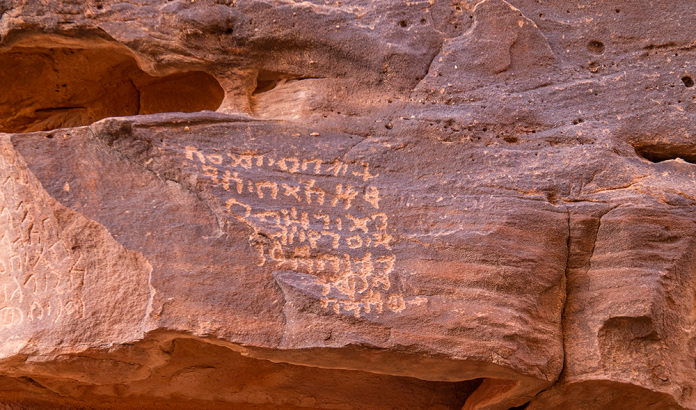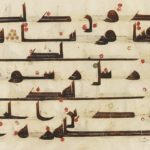
The Arab nation is an oral nation that relied on genealogists and storytellers who memorized their genealogies and their tales by heart because they did not know how to write. And if there were a few who could write, they did not have the means to set down the record, since it was only in 178 AH (795 AD) in Baghdad that the first paper factory in the Arab world was established.
IN ORDER TO FACILITATE the preservation of the Arab, and later the Islamic, heritage the narrators and the author of the Qur’ān relied on rhyme, as something easy for the illiterate to memorize. The Islamic tradition tells us that when Muḥammad ibn Abdullah migrated to Madina, he issued an order to the believers forbidding them to write down anything about him other than the Qur’ān, in order that the Qur’ān would thus not be confused with the hadith. For this reason, the codification of hadiths, or more correctly, the manufacture of hadiths, did not commence until the end of the first century AH, more than a hundred years following the death of those who claimed to have uttered them.
The same thing applied to Islamic history, as its codification did not commence until the eighth century AD, the second of the Hijra, and its historians relied on handed down narrations such as hadiths, so that the historian al-Ṭabarī and others would say: So-and-so told me about so-and-so.
Of course, if the nation is illiterate and cannot write or carve rocks as other nations could, investigating its history becomes difficult. Most Orientalists and some contemporary Arab researchers assert that Islam itself did not emerge until the days of Caliph ‘Abd al-Malik ibn Marwān. The dome of Al-Aqsa Mosque may perhaps testify to this, since it is one of the oldest Islamic historical evidences whereby the name ‘Abd al-Malik ibn Marwān is there associated with some Qur’ānic verses. This dates back to the year 70 AH (692 AD).
In the absence of any excavations and written references, how can we give any date to the Qur’ān or to the emergence of Islam?
Both narrators of the Prophet’s biography and Muslim historians claimed that Muḥammad dictated the Qur’ān to those who wrote down the Revelation as soon as Jibrīl communicated to him new verses, and that the Qur’ān was then put together during the reign of Abū Bakr, then during the caliphate of ‘Umar, and finally during the caliphate of ‘Uthmān. To date, however, we have not found any written Qur’ān that dates back to that time. The oldest copy of the Qur’ān which we have in our hands is the Samarqand codex that was written in Kufic script, along with the San‘ā manuscripts, which were discovered in 1965 in the roof of a mosque in San‘ā and which were also written in Kufic script. This script does not appear in manuscripts until about the second half of the first century AH. Palaeography experts trace the San‘ā manuscripts back to 710-715 AD.
In the absence of any excavations and written references, how can we give any date to the Qur’ān or to the emergence of Islam? Muslims intoxicated by the holiness of Revelation do not care about the history of the Qur’ān because they believe in what the writers of the Prophet’s biography have told them. Orientalists on the other hand set out to examine closely the words of the Qur’ān and arrange its verses and sūras in such a way as to provide us with some certainty. The most penetrative Orientalists on the verses of the Qur’ān were the German Nöldeke, the Scotsman Bell and the Hungarian Goldziher. Despite the great efforts made by these researchers, none of them has been able to date the Qur’ān reliably.
The narrators of the Prophet’s biography invented incidents in order to fill gaps in the story
And there are several reasons for this failure. The first of these reasons is that the Qur’ān was not collected chronologically, according to the date of its revelation. Muslim scholars inform us that when a verse came to Muḥammad he would say to the scribes of the Revelation, “Put this in the place where such-and-such a verse is mentioned.” As a result of these directives, the scribes of the Revelation could place a verse that came in Madina in a sūra that was revealed in Makka. This has happened quite often. For example, we find the Makkan sūrat Al-Muzzammil contains two verses that were revealed in Madina. These are:
Anyone can tell that verse 20 is not part of sūrat Al-Muzammil because it is many times longer than the other the verses in the sūra and its musical timbre is different. There are at least thirty-two Makkan sūras with Madinan verses: Al-Muzzammil, Al-Falaq, Al-Nās, Al-Mursalāt, Qāf, Al-A‘rāf, Yā Sīn, Al-Furqān, Maryam, Al-Wāq‘a, Al-Shu‘arā’, Al-Naml, Al-Qaṣaṣ, Al-Isrā’, Yūnus, Al-Ḥajar, Al-An‘ām, Luqmān, Saba’, Al-Zumar, Al-Shūra, Al-Zumar, Al-Zakhruf, Al-Jāthiya, Al-Aḥqāf, Al-Kahf, Al-Naḥl, Ibrāhīm, Al-Anbiyā’, Al-Mu’minūn, Al-Sajda, Al-‘Ankabūt, Al-Muṭaffifīn. (On these see al-Suyūṭī’s Al-Itqān fī ‘Ulūm al-Qur’ān).
The second reason is that the narrators of the Prophet’s biography invented incidents in order to fill gaps in the story, and these narrations did not always agree with what other storytellers wrote. For example, Ibn Hisham tells us that the reason for ‘Umar’s conversion to Islam was that he once visited his sister and found her reading a page on which were written verses from the sūrat Ṭāhā. Given that Umar, with the agreement of all the narrators, converted to Islam in the sixth year following the beginning of the Message, we can say that sūrat Ṭāhā appeared in year six, or earlier, of the beginning of the Call. But other Companions mentioned different accounts about ‘Umar’s conversion to Islam. For example, Mujāhid mentioned that ‘Umar was passing before the Ka’ba one evening and saw Muḥammad praying in the direction of the Levant. So he sat behind him and listened to him as he read the Qur’ān. His heart was moved, he began to weep, and then professed Islam. So was there some sort of confusion or are can we be certain that sūrat Ṭāhā was revealed in year six, or earlier, of the beginning of the Message?
The third reason is that when the Qur’ān mentions certain incidents it does not give us dates or places for these for us to be able to ascertain them. For example, the Qur’ān tells us:
The Romans have been defeated in the nearer land, and they, after their defeat, will be victorious [Qur’ān XXX (al-Rūm), 2-3].
Since the Qur’ānic script did not have diacritical marks denoting the vowels, we cannot say whether the Romans ‘have been defeated’ (ghulibat) or whether ‘they prevailed’ (ghalabat). The ‘nearer land’ is unspecified, especially since we know that the Romans were in Byzantium, the Levant and at Tabūk. More than forty battles were fought between the Romans and the Persians, and between the Romans and the Arabs, over the course of Islamic history until the fall of Constantinople. Such incidents mentioned in the Qur’ān do not help us in establishing history, but rather only muddy the water more.
Everything Muslim historians have said about the beginning of Islam are nothing but grandmothers’ tales to entertain or pacify minds
The fourth reason is the introduction of ordinary words uttered by Muḥammad at some point into the body of the Qur’ān. For example, at the Farewell Pilgrimage addressing Muslims, Muḥammad said:
“This day I have perfected your religion for you, completed My Favour upon you, and have chosen for you Islam as your religion”.
When the Ottoman Qur’ān was completed, this saying found its way into Sūrat al-Mā’ida in the third verse. Historians agree that the Farewell Pilgrimage occurred in the ninth year following the conquest of Makka. This verse in Sūrat al-Mā’ida may lend support to historians saying that Sūrat al-Mā’ida emerged in the ninth year, but the problem arises when we realize that Muḥammad also told them in the same sermon that “this day I have perfected your religion for you”. This means that by the end of that day all divine legislation is to have been completed. But we know that Sūrat al-Mā’ida was not the last sūra of the Qur’ān that was revealed, since Sūrat al-Nūr and then Sūrat Barā’a came after it in chronological order. Sūrat al-Nūr presented important legislations such as:
As for the fornicatress and the fornicator, flog each of them a hundred stripes (verse 2)
and
And those who accuse free women then do not bring four witnesses, flog them eighty stripes (verse 4)
as well as the verse of cursing:
As for those who accuse their wives but have no witnesses except themselves; let the testimony of one of them be four testimonies, (swearing) by Allah that he is of those who speak the truth (verse 6).
So the verse that says this day I have perfected your religion for you today was either originally not in the Qur’ān, or is in the Qur’ān but did not come with Sūrat al-Mā’ida, or Muḥammad did not say the verse in the Farewell Pilgrimage of year nine. It is thus not easy for the historian to give a firm date for this event.
The commentators only make matters worse by saying that the Al-Ifk incident, in which ‘Ā’isha was accused of going off alone with the young Ṣafwān ibn al-Mu‘aṭṭal, occurred when Muḥammad was on his way back from the Battle of al-Muraysi‘ (of the Banī al-Musta‘liq) which historians agree was in the fifth year AH. The verses that spoke of the incident of Al-Ifk and which exonerated ‘Ā’isha are in the same Sūrat al-Nūr (verse 11):
Lo! they who spread the slander are a gang among you
As historians agree, Sūrat al-Nūr came in year eight AH, so how can the incident of Al-Ifk be in the year five AH and ‘Ā’isha’s exoneration in Sūrat al-Nūr in year eight?

Suggested Reading
The early history of Islam and the scarcity of material artefacts
It is clear from this narrative that everything that Muslim historians have said about the beginning of Islam, the Revelation of the Qur’ān and the collection of the Qur’ān, are nothing but grandmothers’ tales told by people as entertainment or in order to pacify minds so that everyone can sleep peacefully. I believe that what Orientalists have said concerning the fact that the Qur’ān was not completed until the end of the eighth century AD, deserves attention and it is incumbent on Muslims to refute it with evidences and proper arguments, if they have anything that supports their position which the rest of us do not know about.
